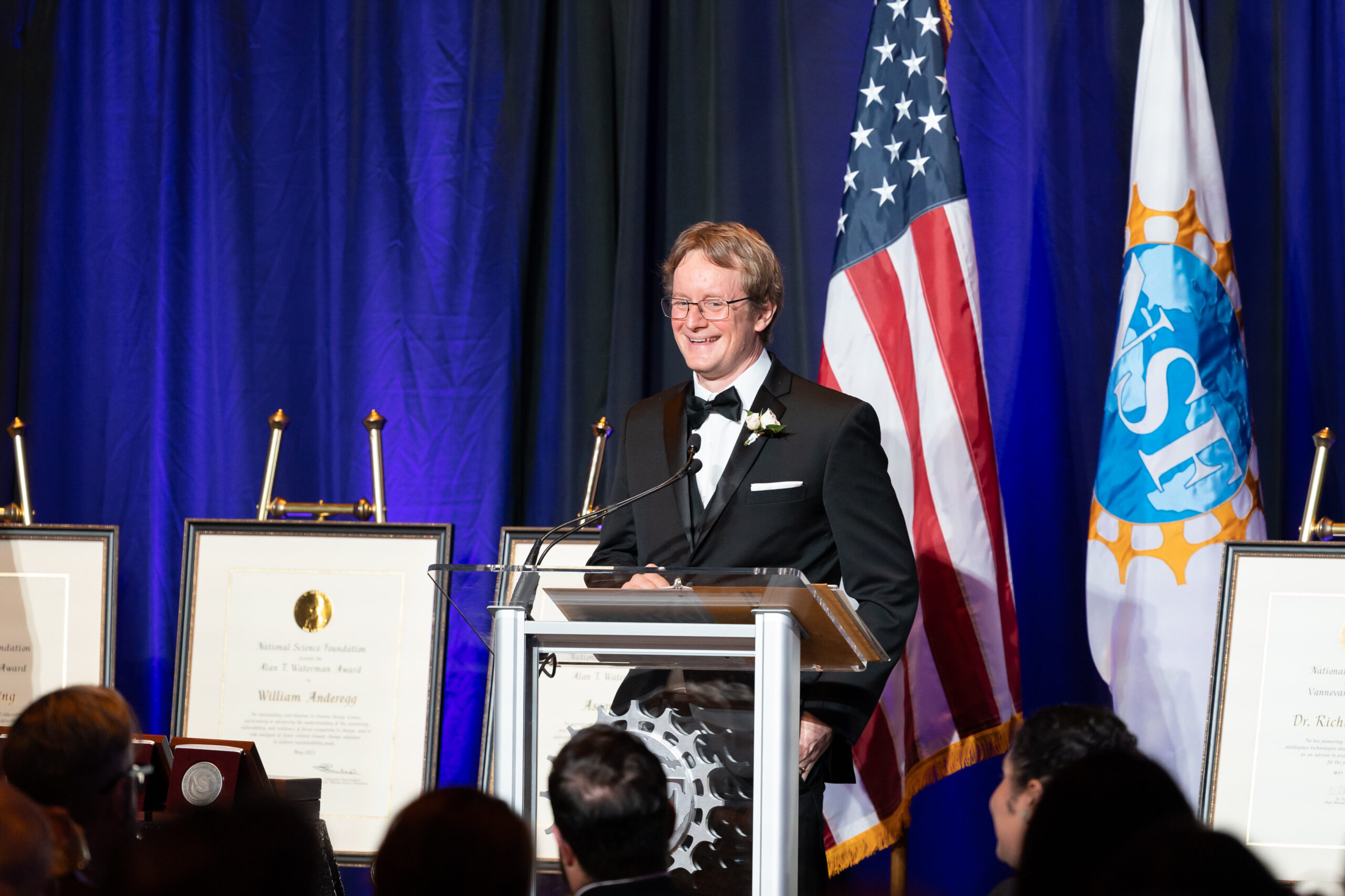
William Anderegg wins prestigious NSF Waterman Award
Today, the National Science Foundation (NSF) announced that William Anderegg, associate professor of biology at the University of Utah and director of the Wilkes Center for Climate Science & Policy, is one of three 2023 recipients of the prestigious Alan T. Waterman Award. NSF is recognizing Anderegg for his contributions to ecosystem and climate change science, particularly in advancing our understanding of the factors that make some forests some sensitive to drought and others more resilient to climate stresses. The Waterman Award recognizes outstanding early-career U.S. science or engineering researchers who demonstrate exceptional individual achievements in NSF-supported fields. Congress established the prize in 1975 in honor of Alan T. Waterman, NSF’s first director.
“Receiving the Waterman Award is incredibly meaningful. It’s an amazing honor and I’m still stunned,” said Anderegg. “It will allow us to take on some really aspirational, creative and high-risk projects that we’ve thought about for a while but can now actually tackle. I’m immensely grateful to the wonderful mentors I’ve had throughout my career who played a huge role in my path as a scientist. I feel lucky to be surrounded by such generous and brilliant scientists, and this award has really made me reflect on how important these people have been and still are in my career.”
In addition to a medal, awardees each receive $1 million over five years for research in their chosen field of science. The Waterman Award will be presented to all recipients at a ceremony during the National Science Board meeting, which will be held in Washington, D.C., on May 9.
The other recipients are Natalie S. King, a science educator at Georgia State University; and Asegun S. Henry, a Massachusetts Institute of Technology mechanical engineer.
The future of Earth’s forests in a rapidly changing climate
Anderegg has devoted his career to understanding the intersection of ecosystems and climate change. He is among the most highly cited researchers examining the future of forest ecosystems as the climate changes. Anderegg’s work highlighting how climate change is worsening seasonal allergies routinely captures international news headlines.
Last year, Anderegg led a multi-disciplinary team of researchers that conducted an unprecedented and comprehensive risk analysis for Earth’s forests over the 21st century.
“The future of Earth’s forests largely hangs in the balance between two opposing sets of processes,” Anderegg explained. “On the upside, rising atmospheric carbon dioxide generally benefits plants and should help trees grow, slowing climate change. But on the downside, climate change increases stress from heat, drought, pests, pathogens and fires, offsetting the benefits of carbon dioxide and sometimes even killing forests, thereby accelerating the pace of climate change. These opposing processes can develop and interact in unpredictable ways, with profound consequences for biodiversity, climate policy and targets and the climate itself. Our lab aims to understand when and where these opposing forces will win out and what it means for Earth’s forests.”
Before bringing his lab to the U in 2015, Anderegg received his bachelor’s degree and doctorate from Stanford University and did a NOAA Climate & Global Change Postdoctoral Fellowship at Princeton University. He has received numerous NSF awards, including an NSF CAREER grant in 2021. He is also a David and Lucille Packard Foundation Fellow for Science and Engineering and a National Oceanic and Atmospheric Administration Climate and Global Change Postdoctoral Fellowship.
Urgently tackling climate change solutions through the U
Under Anderegg’s leadership the U’s new Wilkes Center for Climate Science & Policy, which launched in August 2022, has hit the ground sprinting.
The Wilkes Center will host its first annual Wilkes Climate Summit on May 16-17 at the Cleone Peterson Eccles Alumni House on the University of Utah campus. The Wilkes Center is also narrowing down finalists for its $1.5 million Wilkes Center Climate Prize at the U, with a winner to be announced in September. In April, the Wilkes Center oversaw the launch of a Student Innovation Prize competition that will award $40,000 in prizes for the U students with the best climate solutions. This year the Wilkes Center managed $346,293 in faculty research funds for climate-focused research.
For Anderegg, that’s only the beginning.
He maintains a visionary outlook beyond the very sobering, yet hopeful work that will be required in the coming years for the Wilkes Center, the university, the state of Utah, the nation and the entire planet to get a grip on rising greenhouse gas emissions.
“The scientific understanding is crystal clear—the 2020s are the pivotal decade for climate action,” Anderegg noted. “We have a rapidly closing window to avoid dangerous climate impacts and chart a sustainable and prosperous future. And there are many reasons for optimism and hope. The solutions we need are at hand and starting to scale up. But it’s going to take all of us—we need everyone’s creativity, energy, science and innovation to do this.”
In the coming years, Anderegg wants the Wilkes Center to pull together researchers in teams to tackle “grand challenges” and make big advances in key priority areas of climate forecasting, climate impacts/risks and climate solutions. The Wilkes Center will launch a speaker series with world-renowned researchers, and support a climate-focused entrepreneurial class. He also hopes to continue successful statewide collaborations as modeled by the Great Salt Lake Strike Team, to tackle major climate challenges facing Utah and to help recruit world-class researchers in climate science and solutions to the U.
By Ross Chambless, Communications and Community Engagement Manager. Originally published at @TheU.